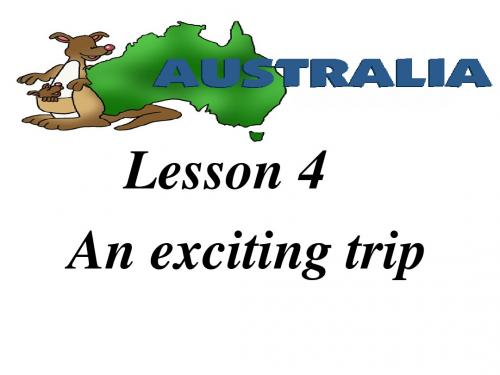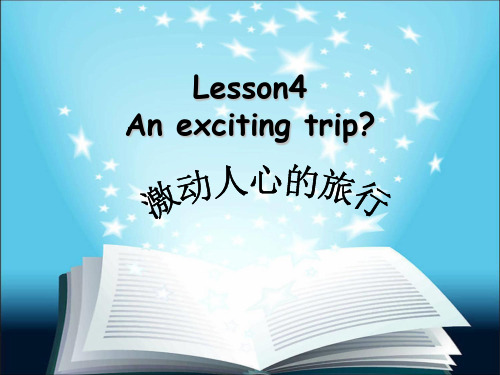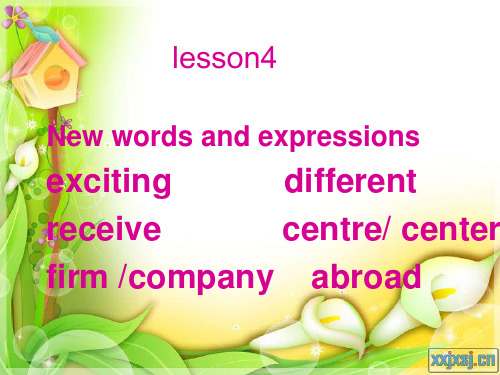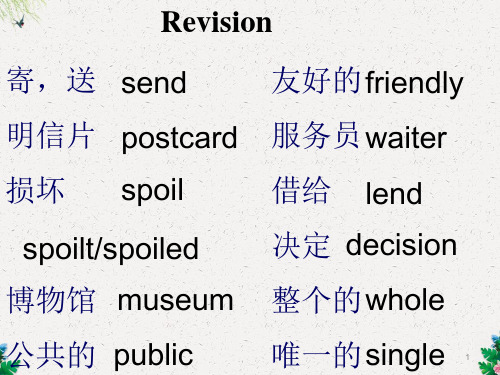(完整版)新概念二Lesson4课件PPT
新概念英语第二册Lesson4

• 1. Do you like traveling? • 2. Where would you like to travel?
Visiting the world’s famous landmarks
The Empire State Building
My plan/idea is different from yours.
We are planning something different this year. (2)各种各样的,不同的:
He has visited many different places in China. 他去过中国的不少地方。
go abroad 去国外 live abroad 到国外定居 study abroad 到国外学习 他在国外生活了许多年。 He lived abroad for many years. 你出国度假吗? Are you going abroad for your holidays?
■a (great) number of: “许多”,修饰可数名 词的复数
receive an invitation [a letter] from sb 接到某人的邀请函[信] 2.接待,接见 You need a large room if you are going to receive so many
guests. 如果你要接待这么多客人,你就需要一个大房间。 We usually receive guests on Saturday. 我们通常星期六招待宾客。
1. I have just received a letter from my sister, Tim. False. I have just received a letter from my brother, Tim.
完整版)新概念英语第二册lesson-4(含课文、练习)

完整版)新概念英语第二册lesson-4(含课文、练习)b) Tim is an XXX。
2.What has Tim XXX?XXX.3.Where is Alice Springs?Alice Springs is a small town in the XXX.4.Where is Tim going after he visits Darwin?XXX.5.Why is Tim finding this trip exciting?Tim is XXX because he has never been abroad before.Tim works as an XXX Austrian company。
It is XXX is true een Tim working for an Austrian firm or a big firm。
but it is known that he works as an engineer。
The true statement is that Tim has been in Darwin for six months。
It is not his first timetraveling abroad。
as he is XXX is not in the center of Australia。
and there is no n given about Tim'XXXXXX。
Tim has been in Australia for six months。
and it is unclear how long he will stay。
His XXX。
XXX an Australian car。
but there is no n given about when he bought it。
Tim has never been to Alice Springs before。
新概念第二册lesson4(共32张PPT)

recently(最近); already(已经); lately(最近);now(现在);for 一段时间;
since+时间;疑问句和否定句中常用ever,yet, never,not…ever等。
同位语He has just bought an Australian car and has gone to Alice Springs, a small town in the centre of Australia.
1) 影响现状动作: 即表示,该动作已经完成, 但是对现在有影响。
何谓有影响? 现在完成时与过去式比较
I had dinner. 我曾经吃了晚饭。(我吃过了晚饭,但与现在无
关,现在可能饿了)
I have had dinner. 我已经吃过晚饭。(我已经吃过了晚饭,现在已
经饱了) He has broken his leg. 他的腿断了。 (还没好) He broke his leg. 他腿曾经断过。 (已经好了)
★abroad adv. 在国外
go abroad 去国外 live abroad 国外定居 study abroad 国外学习 travel abroad. 出国旅游
at home and abroad overseas adj./ adv. 海外的
词语辨别
Abroad Aboard adv:在飞机/船/火车上 Board n 木板 v 上(飞机/火车/船) Broad adj 宽广的 adv 宽广地
buy
have
open
be open
join
be in/a member of
start/begin be on finish/ end
新概念第二册lesson4(共17张PPT)

An exciting trip
激动人心的旅行
Ⅰ Key words and expressions
exciting a.令人兴奋的, 使人激动的 This news is very exciting . excited a.(自己)感到兴奋的 We are very excited about this news.
interesting 有趣的 interesting novel interested (人对物)兴趣的 surprising adj.令人惊讶的 surprised adj.(人)感到惊讶的
Ⅰ Key words and expressions
receive v. 接受,受到
receive a letter from sb.
Perth
Ⅱ Listen , answer and read
Questions on the text How long had Tim been in Australia? What does he do in Australia? Why is Tim finding the trip exciting?
Ⅴ Key structures & special difficulties 动词时态之 :现在完成时
1. 表示一个动作发生在过去但对现在仍然有影响。常与 表不确定时间的状语或表一段时间的时间状语连用。
2. 时间状语: just, already, lately, ever, (not) yet, so far, up till now, for six months, since 1955. 3. 汉语意思表:已经 4. 表一段时间的时间状语, 不能和点动词(非延续性)连用. I have lived/been here for four years. He has just retired. He has already retired. Has he retired yet? He hasn’t retired yet. I have bought this book for ten months. (×) I have got this book for ten months.
新概念英语第二册Lesson4课件

New words
firm n.商行,公司 law firm法律公司
公司
=company
different adj.不同的—— same相同的
adv. differently, n. difference
e.g. My coat is different from yours.
和…相同,一样
be the same with/as
--他们已经离开了,也就是说现在他们人不在这里
I have had my lunch.
--我已经吃过午饭了,也就是说我现在不饿
也可表示持续到现在的动作或状态。
He has learned English since 2001.
现在完成时与一般过去时的比较
1)一般过去时表示过去某时发生的动作或 单纯叙述过去的事情,强调动作;
yesterday.
6. There ___w_a__s(be) a telephone call for you just now. 7. When _d_i_d___ you _c_o__m__e(come) to China?
----Last year.
8. Yesterday I _t_h_o_u__g_h__t (think) that you were not in
现在完成时为过去发生的,强调过去的 事情对现在的影响,强调的是影响。
I saw this film yesterday. (强调看的动作发生过了。) I have seen this film. (强调对现在的影响,电影的内容已经知道 了。)
Grammar
2一般过去时常与具体的表示过去的时间状语连用; 现在完成时通常与模糊时间状语连用或无时间状语。
新概念英语2 lesson4

5. 现在完成时还往往可以同包括现在时 间在内的时间状语连用,如 间在内的时间状语连用 如now, up to these few days/weeks/months/years, this morning/week/month/year, now, just, today, up to present, so far等: 等 Peter has written six papers so far. Man has now learned to release energy from the nucleus of the atom. There has been too much rain in San Francisco this year.
3. 现在完成时往往同表示不确定的过去 现在完成时往往同表示不确定的过去
时间状语连用 连用,如 时间状语连用 如already, yet, just, before, recently, lately等常位于句末。 等常位于句末 等常位于句末。 He has already obtained a I haven't seen much of him recently (lately). We have seen that film before. Have they found the missing child yet 。
4. 现在完成时常常与表示频度的时间状 语连用,如 语连用 如often, sometimes, ever, never, twice, on several occasion等: 等 Have you ever been to Beijing ? I have never heard Bunny say anything against her. I have used this pen only three times. It is still good. George has met that gentleman on several occasions.
新概念2 Lesson 4课件(共39张PPT)

3.He has been there for six months. 他在澳洲已经待了六个月了。 for six months是表示时间段的状语。 特别提醒:"for+时间状语"不能和瞬间性动词连用。 He arrived there for six months.(错误) He has been there for six months.(正确)
gone to Alice Springs, a small town in the centre of
Australia. 他刚买了一辆澳洲产的小汽车,现在去了在澳大利亚中部 的一个小城镇,艾莉斯普林斯。 (1) 比较两个句子:He has gone to the cinema.
他去了电影院。(还没有回来)
finding this trip very exciting. 我弟弟以前从来没有出过国,所以他觉得他的这次旅行非 常激动人心。 (1) before单独放在句尾表示从前,常与完成时连用。 (2 )very exciting补充说明this trip,做宾语补足语。
语法 Grammar in use
7.He will soon visit Darwin. 很快,他将去参观达尔文。
1)visit somewhere参观某地: visit Shanghai参观上海; visit Zhouzhuang参观周庄
2)visit sb.拜访某人: visit my uncle看望我的伯父; visit closet classmate拜访最亲密的同学
a great /good lot fun大量的玩笑 4)a whole lot of一大堆,许多:
a whole lot of paper一大堆纸 5)a great number of很多的,常修饰可数名词 6)a great many很多的(多用于写作中),常修饰可数 名词
新概念英语第二册Lesson4(共49张PPT)

He lived abroad for many years. 你出国度假吗?
9
■different adj.不同的—— same相同的
(1)不同的,相异的(经常与from连用): be different from...与…不同 Desks are different from tables.
My plan/idea is different from yours.
We are planning something different this year. (2)各种各样的,不同的:
He has visited many different places in China. 他去过中国的不少地方。
This department store sells a large number of different things.
这家百货商店出售许多各种各样的东西。
adv. differently, n. difference
3
【辨】 exciting, thrilling ['θrɪlɪŋ] exciting 通常来形容让人很激动的人或事; thrilling 用来形容让人激动或害怕的发抖、令
人难以控制情绪的事
-ed自己感到 interested, bored, -ing令人感到interesting,boring, I am interested in this book. This is an interesting book.
Revision
寄,送 send 明信片 postcard 损坏 spoil
spoilt/spoiled 博物馆 museum
- 1、下载文档前请自行甄别文档内容的完整性,平台不提供额外的编辑、内容补充、找答案等附加服务。
- 2、"仅部分预览"的文档,不可在线预览部分如存在完整性等问题,可反馈申请退款(可完整预览的文档不适用该条件!)。
- 3、如文档侵犯您的权益,请联系客服反馈,我们会尽快为您处理(人工客服工作时间:9:00-18:30)。
Lead—in
Do you like travelling? Have you been to Australia? What do you know about Australia?
koala
Sydney Opera House
kangaroo
Snapshot of Key words
exciting [ɪk‘saɪtɪŋ] adj. 令人兴奋的 receive [rɪ‘siːv] v. 接受;收到 firm[fɜːm] n. 商行;公司 different [‘dɪf(ə)r(ə)nt] adj.不同的 centre [‘sentə] n. 中心 abroad [ə‘brɔːd] adv. 在国外
get abroad 出去, 出门; (谣言)传出去, 传开 go abroad 去国外 live abroad 到国外定居 study abroad 到国外学习
【近形词区别】abroad与aboard abroad = a + broad(adj. 宽的;辽阔的) adv. 到海外 aboard = a + board(n. 板子; 甲板) adv. 在船上; 在飞机上
Lesson 4 An exciting trip
默写 Lesson 3
• 1 Postcards - spoil - holidays • 2 summer - Italy • 3 museums - sat - gardens • 4 waiter - few - Italian • 5 lent - book, but - understand • 6 Every day - thought - postcards • 7 holidays - quickly - not - cards - friends • 8 last day - decision • 9 early - thirty-seven cards • 10 whole day - room - not - single card
She received his present, but she didn’t accept it. 【Exercise 选词填空】
I ____A_____ the invitation. A. accepted B. received
firm[fɜːm] n. 商行;公司
1. n. 公司,商号 law firm 法律公司 e.g. 他在一家工程公司工作。
He works for an engineer firm.
2. adj. 结实的,稳固的 e.g. 这部小汽车非常坚固。
The car is very firm.
【了解】有关“公司”的表达:firm 中小型公 司;company正规公司;business商行;
centre [‘sentə] n. 中心 (美式center)
课文精析
➢ I have just received a letter from my brother, Tim.
现在完成时表完成结束
同位语
➢ He is in Australia. He has been there for six months.
现在完成时表持续
➢ Tim is an engineer.
e.g. 他在国外生活了许多年。 He lived abroad for many years.
New text
watch the video then answer the following question
Questiona letter from his brother? Yes, he has.
➢ He is working for a big firm and he has already visited a
great number of different places in Australia.
Q2. Where is the writer’s brother? He is in Australia.
Q3. How long has Tim been there? He has been there for six months.
Q4. What's Tim’s job? He's an engineer.
the center of town 市中心 town centre= downtown 市中心,市区
经典用法: in the center of: 在中间, 在中央 = in the middle of
in the centre (of sp),
adj. central中央的,中心的
abroad [ə‘brɔːd] adv. 在国外
exciting [ɪk‘saɪtɪŋ] adj. 令人兴奋的
exciting a.令人兴奋的, 使人激动的(主语让别人感 到兴奋)
e.g. This news is very exciting .
excited a.(主语自己)感到兴奋的(主语是通常为 人)
e.g. We are very excited about this news.
原文 I have just received a letter from my brother,Tim. 我刚刚收到我兄弟Tim的来信。
词组 receive a letter from sb. = hear from sb. 收到某人的来信
区别用法:receive 和 accept 1. receive(客观情况)只表示被动地接受 2. accept(主观情况)总表示主动而且高兴地接受 e.g.她收到了他的礼物,但是没有接受
-ed主语自身感到 e.g. interested, bored, ... -ing主语令别人感到 e.g. interesting,boring, …
【Exercise: 中译英】
这是多么令人兴奋的消息!
【参考译文】What exciting news this is!
receive [rɪ‘siːv] v. 接受;收到
